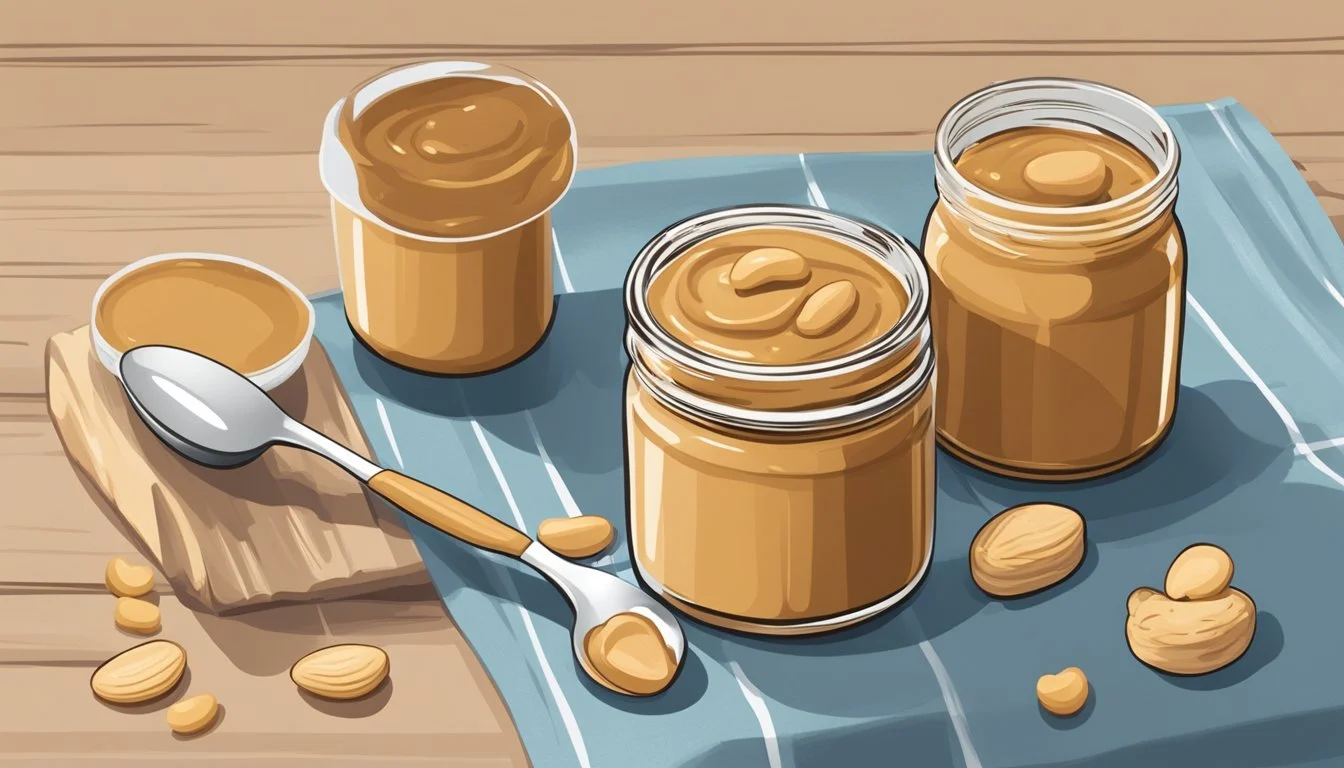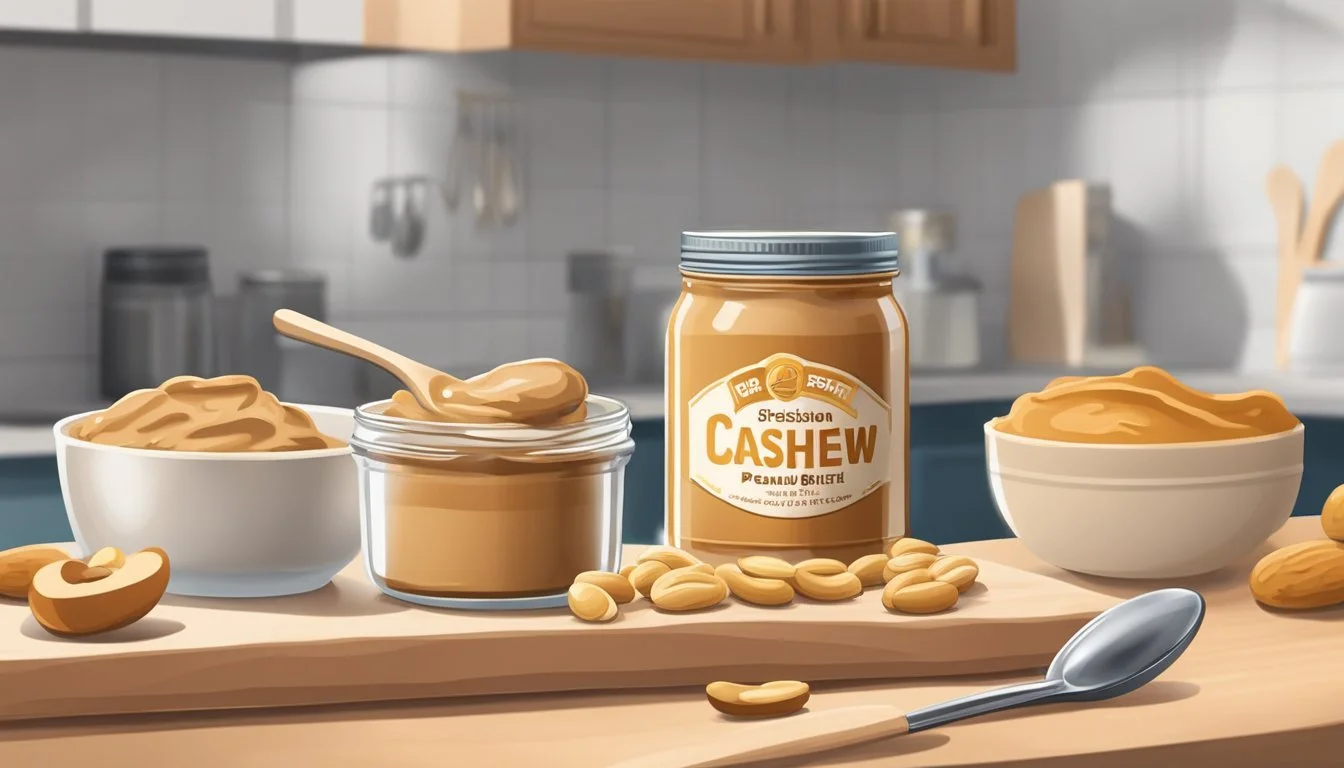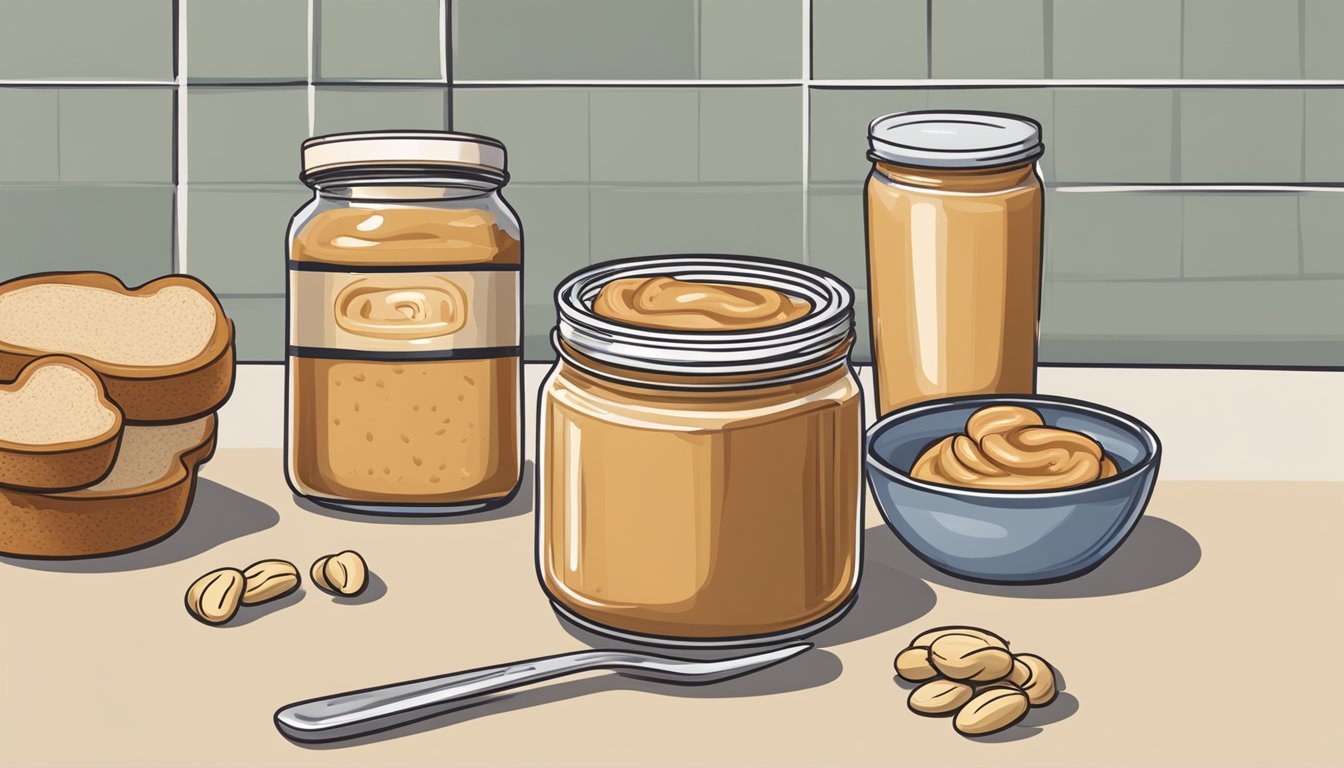How to Substitute Cashew Butter for Peanut Butter
A Seamless Swap Guide
Cashew butter offers a creamy and nutrient-rich alternative to traditional peanut butter, making it a viable option for those looking to vary their diet or manage peanut allergies. With a similar texture and richness, cashew butter can seamlessly fit into recipes calling for peanut butter, including baking, sandwiches, and sauces. It is known for its mild, sweet flavor profile, which can complement a range of dishes without overpowering other ingredients.
While cashew butter is generally more expensive than peanut butter, its use in a 1:1 substitution ratio makes it an easy replacement in most recipes. This alternative not only caters to those with peanut allergies but also to individuals seeking a different nutritional profile, as cashew butter contains heart-healthy fats, essential vitamins, and minerals. It's also a good source of plant-based protein, although it's crucial to note that its fat content may be higher than that of peanut butter.
Opting for cashew butter as a substitute is a straightforward process that requires little adjustment in quantity. However, flavor variations should be anticipated, and individuals may need to experiment with seasoning adjustments to achieve their desired taste outcome. The natural oils found in cashew butter could slightly alter the texture of some recipes, though typically these differences are subtle and do not compromise the final product.
Understanding Cashew and Peanut Butter
When choosing between cashew butter and peanut butter, one must consider their distinctive nutritional profiles, allergy implications, and sensory characteristics.
Nutritional Comparison
Cashew butter and peanut butter offer similar caloric values and contain healthy fats, but they have different nutritional benefits. Peanut butter provides a more substantial amount of protein and fiber which is beneficial for maintaining muscle health and digestive regularity. It typically contains about 8 grams of protein and 2 grams of fiber per serving. In contrast, cashew butter has a higher carbohydrate content and offers more magnesium, vitamin E, and monounsaturated fats, making it a good choice for heart health.
Nutrient Cashew Butter (per serving) Peanut Butter (per serving) Calories ~94 kcal ~94 kcal Protein ~3 grams ~8 grams Fiber ~1 grams ~2 grams Magnesium High Moderate Vitamin E Higher Lower
Allergy Considerations
Peanut butter can be a significant allergen and is not suitable for those with peanut allergies. Cashew butter, while less common as an allergen, is still a concern for individuals with tree nut allergies. For those looking for nut-free alternatives, sunflower seed butter is often recommended as a similar tasting substitute that is free from the most common nut allergens.
Taste and Texture Profile
Taste-wise, peanut butter is known for its robust, slightly salty, nutty flavor while cashew butter is typically milder with a sweeter note. Texturally, cashew butter is creamier and smoother than peanut butter, which could affect mouthfeel in recipes. Consumers who prefer a less overpowering taste often lean towards cashew butter, whereas those who enjoy a pronounced nutty flavor might opt for peanut butter. Both can be found in creamy and crunchy varieties to suit texture preferences.
Substituting Cashew Butter in Recipes
Cashew butter, with its creamy texture and mild nutty flavor, can be a surprisingly versatile ingredient in the kitchen. This section explores how to effectively use cashew butter as a substitute in various recipes, from baking to creating healthy snacks.
Baking Applications
In baking, cashew butter can replace peanut butter one-for-one to create moist and flavorful cakes, cookies, and brownies. The subtle taste of cashew butter complements chocolate and fruit-based desserts well. For doughs and batters that require a nutty element, cashew butter ensures a consistent texture without overpowering other ingredients.
Cooking With Cashew Butter
When cooking savory dishes, cashew butter can enrich sauces and salad dressings with its richness and depth. It is an excellent thickening agent for gravy and can also bring a creamy dimension to a stir-fry sauce. It's important to note that cashew butter might not impart the same strong flavor as peanut butter, making it suitable for dishes where a milder nut taste is desired.
Uses in Breakfast and Smoothies
Cashew butter adds a protein boost and smooth consistency to morning smoothies and oatmeal bowls. Its flavor doesn't dominate, allowing the natural taste of fruits and other mix-ins to shine through. It can also serve as a nutritious spread on toast, pairing well with jams, jellies, or just a slice of fresh fruit.
Creating Healthy Snacks
For an energizing snack, cashew butter can be swirled into granola, used to make granola bars, or served as a dip for fresh fruit slices. As a base for energy bites, it binds ingredients like oats and dates without the need for added sugar. Homemade cashew butter can also be a healthier alternative to processed spreads for PB&J sandwiches.
Comparing Other Nut Butter Substitutes
In the quest to find suitable alternatives to cashew butter, there is a variety of other nut butters and nut-free options that can be used depending on dietary restrictions and flavor preferences.
Nut Butters Beyond Cashews and Peanuts
When considering substitutes for cashew butter, one should explore the world of other nut butters, which offer unique flavors and textures. Almond butter is a common alternative, known for its slightly grainier consistency and its rich, nutty taste. Other options include walnut butter, with its distinctive earthy quality, and hazelnut butter, often celebrated for its indulgent taste, especially when paired with chocolate. Moreover, butters made from macadamia nuts, pecans, and pistachios provide diverse flavors and can be used in similar proportions to cashew butter.
Seed-Based and Nut-Free Options
For those with nut allergies or preferences for seed-based spreads, sunflower seed butter is an excellent cashew butter substitute, delivering a similar creamy texture. Tahini, made from sesame seeds, offers a more savory profile that works well in both sweet and savory recipes. These options cater to individuals seeking nut-free alternatives while still maintaining the creamy consistency of traditional nut butters.
Exploring Legume-Based Spreads
Legume-based spreads like soy nut butter—made from soybeans—and powdered peanut butter provide a protein-rich and allergy-friendly cashew butter substitute. These spreads maintain the creamy texture one might seek in nut butters and are suitable for various culinary applications, from baking to sandwich making.
Nut-Free Options and Unique Substitutes
In addition to the more conventional substitutes, there are a few unique alternatives, such as coconut butter, which carries a sweet, tropical flavor profile, and granola butter, which imparts a wholesome, oaty taste perfect for breakfast dishes. These options are valuable for those desiring a departure from traditional nut flavors or for those needing completely nut-free options.
DIY: Making Your Own Substitutes
Creating substitutes for cashew butter can be simple, whether one seeks to replicate the creamy spread or cater to specific dietary requirements. Homemade options offer control over nutrition and taste, allowing the avoidance of added sugars or oils found in some store-bought products.
Homemade Cashew Butter
To make homemade cashew butter, begin with high-quality, raw unsalted cashews. Roast the cashews at 350°F (175°C) until lightly golden, usually for about 10 to 12 minutes, which will enhance their flavor. Once cooled, blend the cashews in a food processor until a creamy spread forms. It may take several minutes, and scraping down the sides periodically is necessary. The result is a homemade cashew butter that's not only fresh and flavorful but also rich in healthy fats, vitamins, and minerals.
Creating Alternative Spreads
For those with nut allergies or seeking variety, alternative spreads can substitute cashew butter in recipes. Nut-free alternatives include:
Sunflower Seed Butter: Mirrors the consistency and has a distinct, rich taste.
Soy Nut Butter: A good option providing a similar texture.
Apple Butter: Offers a naturally sweet flavor profile, ideal for certain recipes.
These substitutes maintain a spreadable nature and can often be used in a 1:1 ratio in place of cashew butter.
Customizing Flavor and Nutrition
When making your own butter, one has the advantage to customize for flavor and nutrition, avoiding unnecessary additives. One might:
Infuse flavors: Add cinnamon, vanilla, or cocoa for a unique taste.
Enhance nutrition: Incorporate flaxseed or chia for added omega-3s.
Control texture: Adjust processing time to create either a smoother or more textured butter.
By controlling the ingredients, homemade spread makers can eliminate added sugars and oils, making a healthier product tailored to their preferences.
Shopping and Storage Tips
When shopping for cashew butter to replace peanut butter, one should consider quality and taste preferences. Organic or all-natural varieties often offer a purer flavor, though may come at a higher price point. To ensure a proper 1:1 substitute, shoppers should opt for smooth cashew butter to mimic the texture of peanut butter closely.
For storage, cashew butter can exhibit a similar shelf life to peanut butter. A sealed jar of cashew butter generally remains fresh in the pantry for 2-4 months. Once opened, it's best to store the butter in the refrigerator to extend its freshness to 6-9 months, while also preventing oil separation. Below are key points to remember for storage:
Before Opening:
Store in a cool, dry place such as a pantry.
Keep away from heat sources which can cause separation.
After Opening:
Refrigeration is recommended.
Ensure the lid is tightly sealed after each use.
Stir well if oil separation occurs, as it is a natural process.
To identify when cashew butter has spoiled, one must look out for changes in texture, odor, and taste. Any sign of rancidity or mold growth indicates that it's time to discard the product. Proper preservation techniques will minimize the risk of spoilage and maintain the spread's quality.
Health and Diet Considerations
When substituting cashew butter for peanut butter, it's important to consider the impact on calorie intake, the inclusion of healthy fats, effects on blood sugar levels, and suitability for restricted diets.
Calories and Weight Management
Cashew butter typically contains similar calorie content to peanut butter, making portion control important for weight management. It is vital for individuals tracking their caloric intake to adjust portions accordingly, as both spreads are calorie-dense due to their high fat content.
Nutrient Comparison per 2 Tbsp:
Calories: Cashew butter – approximately 180, Peanut butter – approximately 188
Fat: Cashew butter – 14g, Peanut butter – 16g
Benefits of Healthy Fats
Cashew butter provides a significant amount of monounsaturated fats, which are considered heart-healthy. These fats can help in lowering bad cholesterol levels and may contribute to cardiovascular health. Additionally, cashew butter contains essential fatty acids that are crucial to one's diet.
Key Fatty Acids in Cashew Butter:
Monounsaturated fats: Positive impact on heart health
Polyunsaturated fats: Essential for body functions
Impact on Blood Sugar Levels
Compared to foods high in carbohydrates, cashew butter has a low-carbohydrate profile, which can be beneficial for stabilizing blood sugar levels. Its relatively low sugar content makes it a suitable option for those managing diabetes or looking to minimize blood sugar spikes.
Macronutrient Comparison:
Sugars: Cashew butter – 2g, Peanut butter – 3g
Carbohydrates: Cashew butter – 8g, Peanut butter – 6g
Integrating into Restricted Diets
Cashew butter is a viable option for certain restricted diets. It fits well within a vegan diet as it's plant-based. People with peanut allergies may turn to cashew butter as an alternative, although those with tree nut allergies must avoid it. It also suits a Paleo diet, whereas peanut butter, a legume, usually does not.
Diet Suitability:
Vegan: Yes; plant-based and dairy-free
Paleo: Cashew butter is often considered Paleo-friendly; peanut butter is not
Allergies: Suitable for those with peanut allergies but not for those with tree nut allergies
Conclusion
In substituting cashew butter for peanut butter, one should proceed with confidence, knowing that both spreads are interchangeable in a 1:1 ratio. This substitution can accommodate dietary restrictions or simply offer a change in flavor profile. Almond butter, as a worthy alternative, shares a similar price point and nutritional composition with cashew butter, ensuring a seamless transition in recipes.
For those navigating nut allergies, sunflower seed butter stands as a reliable option. Its nut-free composition allows individuals to enjoy a similar texture and taste without the risk of allergic reactions.
A preference for peanut butter may stem from its higher protein and fiber content compared to cashew butter. Peanut butter also ranks lower on the glycemic index, which could be a deciding factor for individuals monitoring their blood sugar levels.
The final choice of substitute will depend on one's personal preferences, nutritional requirements, and the specific culinary context. With these considerations in mind, the switch from cashew to peanut butter should yield satisfactory results in both savory and sweet dishes.
When altering a well-loved recipe or trying something new, maintaining the essence of the dish while making necessary adjustments is key. Substitutes can perform admirably, ensuring that the end result remains enjoyable and true to one's dietary needs.






